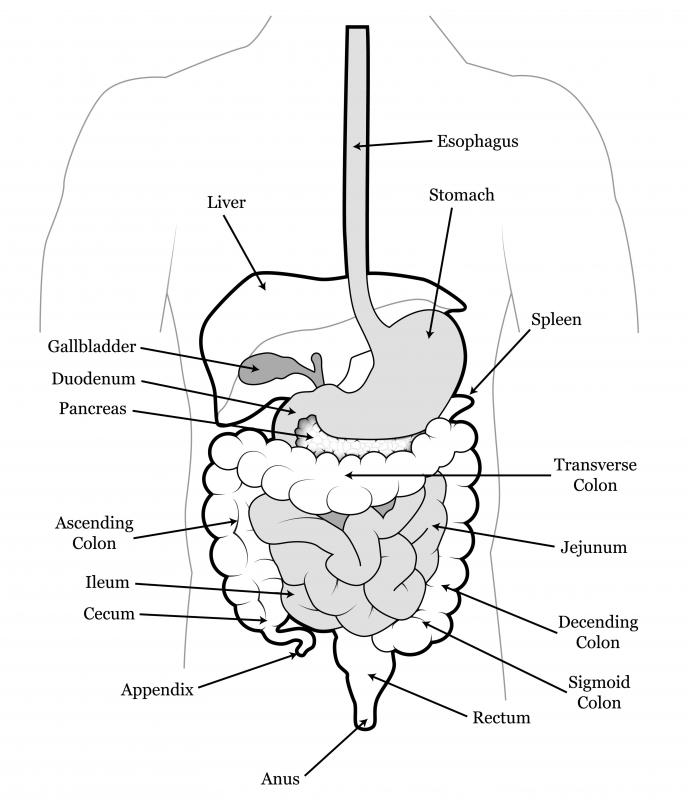At TheHealthBoard, we're committed to delivering accurate, trustworthy information. Our expert-authored content is rigorously fact-checked and sourced from credible authorities. Discover how we uphold the highest standards in providing you with reliable knowledge.
What Is a Tubulovillous Adenoma?
A tubulovillous adenoma, or TVA, is a type of polyp found in the lower parts of the digestive tract, which are known as the colon and rectum. Polyps are masses of fleshy tissue and, in the bowel, they grow from epithelial tissue in the wall of the intestine, projecting into the inner space. Although this is a benign tumor, meaning it is not cancer, it has the potential to become malignant, or cancerous. For this reason, the usual treatment is surgical removal.
There are different types of bowel polyps but adenomas, which are of glandular origin, are the ones most likely to become malignant. A number of factors affect how likely it is that a specific adenoma will transform into a cancer. These include the appearance of the cells when viewed under a microscope and the size of the tumor. If a tubulovillous adenoma, or any other adenoma, grows larger than half an inch (about 1 cm) in size, this is associated with an increased risk of becoming malignant.

Adenomas are named according to the way their cells are arranged and may be tubular, villous, where cells form finger-like growths, or tubulovillous, with a mixture of the two structures. Most adenomas are the tubular type, with tubulovillous adenomas being seen less often, and villous adenomas being found in only around five percent of cases. A tubular adenoma is least likely to become malignant, while villous adenomas are most likely, and this type of adenoma is somewhere between the two.

Typically, polyps such as the tubulovillous adenoma do not cause any symptoms but occasionally blood may be passed from the rectum. Often, this is such a small amount that it is not visible with the naked eye. If a polyp grows very large it can lead to health complications such as pain and cramping of the abdomen, and there is a possibility the intestine could become blocked.

Diagnosing a tubulovillous adenoma generally involves carrying out a procedure known as a colonoscopy. Here, a flexible, slender tube is passed up through the anus into the large bowel and a camera attached to the instrument sends back pictures of the inside of the intestine. The surgeon can view moving images on a monitor as the tube, known as an endoscope, moves along inside the bowel.

Treating a tubulovillous adenoma involves removing it surgically, and this may be carried out at the same time as the initial colonoscopy. Specially adapted surgical tools associated with the endoscope can be used to cut away any polyps found during the procedure. The polyps are then studied microscopically to check for signs of cancer. Further surgery may be necessary if a polyp has not been fully removed, or if cancer is found.
AS FEATURED ON:
AS FEATURED ON:


















Discussion Comments
What type of diet should one have when being told of this type of diagnosis?
Just prior to turning 50, I went in for a colonoscopy. The doctor found a 3cm tubulovillous adenoma near the connection to the small intestine. He could not get completely out via endoscope I so had surgery. I never had any symptoms but apparently this polyp was likely to become cancerous over time, so I'm glad I got this taken care of.
@SimpleByte one cause is believed to be heredity. A sedentary lifestyle, a high fat diet, and being overweight may also contribute to the development of colon polyps. For tubulovillous adenomas, another possible factor is age. This type of adenoma develops more frequently in patients between ages 60 to 70.
@Nefertini, I agree that colonoscopies are important, particularly for people over 50. What causes polyps? Is there any way to prevent them?
When I reached the age of 50, my doctor wanted me to have a routine colonoscopy. They found two polyps which they removed during the colonoscopy. Fortunately, my polyps were benign. One was an adenomatous polyp, and I had not experienced any symptoms prior to the colonoscopy. My friend's colonoscopy showed she had colon cancer. Her biopsy indicated the cancer had originated in her lymph glands then metastasized to the colon. Thank goodness for the colonoscopy that diagnosed it, so she could begin receiving treatment. Thank goodness for my colonoscopy, too, so I could get my polyps removed since polyps can sometimes become cancerous over time.
Post your comments